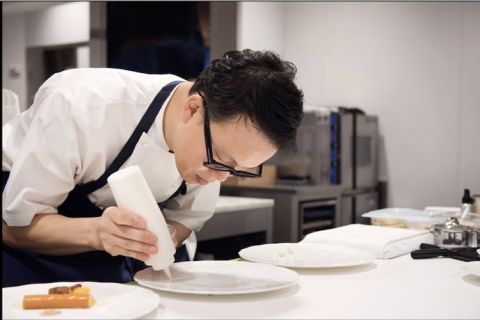Chefs are passionate technicians. They tend to be young and in a hurry. Most are extremely enthusiastic about feeding as many customers as possible and, in my experience at least, they do not adapt to boredom very easily.
Cut off from their colleagues and customers by the pandemic, they have had to adapt. Many have put their skills at the disposal of those feeding the needy and those working to support front-line workers. Others have followed their noses and their stomachs.
Sam Kamienko is one such chef. Born in Australia to Polish parents, he came to London via stints in New York and Paris before he joined Leroy in Shoreditch, which won a Michelin star in 2019. When the restaurant closed he found himself living in Earls Court. This area of west London reminded him of his days in New York and his mind started to wander to bagels, that quintessential Jewish baked staple.
Kamienko started to bake them in his kitchen at home, researching on the internet and also asking his Polish father, himself under lockdown in Melbourne, to investigate the logo for a family-owned bagel business. ‘Having a Polish Jewish father resonated with me’, he confessed.
Through the first lockdown, Kamienko continued to refine his bagels, a product which he admits is apparently simple but at the same time quite tricky to get right. To give himself some routine he decided to start selling them three to four days a week. ‘I get up early, shape, boil and bake the bagels which come with five different toppings (plain, pumpkin and sunflower seed, poppy seed, sesame seed and "everything". Then I pack and cycle them all over London.’
To my question of how business is, his emailed response was breathless. ‘I am currently inundated with orders. The combination of Instagram (@samkamienko) and lockdown, and that they are delivered by bicycle, has really spread the bagel love. I can bake 60 a day which I have pushed to 80, so on average I have been making around 300 bagels a week. Who knows where my future may lie?’
The route of Hanzhou Piao, pictured above and in our main picture, to delivering his homemade dumplings around Paris, also by bike, proved a little more circuitous.
Born in China, he eventually moved via Vancouver to Paris and secured jobs cooking at Ellsworth restaurant and Pierre Gagnaire’s Gaya. Before lockdown, he had started taking his own dumplings to friends’ dinner parties and ‘the notion of starting my own business had floated across my consciousness’. But long hours and the fact that he was a Michelin-trained chef meant that he took this no further. During the first lockdown, he volunteered to cook in a collective that made meals for 800 hospital staff and during the weekend he made, froze and gave away his dumplings.
When the new curfew was announced in late 2020, Piao decided his moment had come. He worked in the restaurant during the day before rushing home to make dumplings that he would deliver at the weekend. A single Instagram post @hnzooo resulted in his first weekend order of 27 boxes, each containing 12 dumplings.
With Gaya now restricted to takeaway only, Piao works from 8 am to 5 pm before rushing out to buy supplies and ingredients for the weekend. He now has a list of over 200 customers who take the 100 boxes of dumplings he can make and deliver in a weekend. Like Kamienko, he is delighted with the number of repeat orders from those who come back for more.
As demand has grown, so has his repertoire: classic dumpling fillings such as pork and shiitake have been followed by far more adventurous flavours such as veal, ‘nduja and raclette. This has been matched by Piao’s increasing grasp of bicycle maintenance. ‘My first bike broke beyond repair after my first week’s delivery. Since then I have learned how to fix and repair all the parts on my single fixed-gear bike.’ The lure of restaurants appears to be too strong for Piao to continue full-time as a dumpling chef but he admits that he may have to keep going, to satisfy customers who have become good friends.
Being united again with his customers/friends is what most delights Jiho Kim, the talented, Korean-born pastry chef from the two-star Michelin restaurant The Modern in New York. When it closed in March 2020 Kim said he was ‘desperate’ but rather than sitting at home, he offered his services to cook for customers. But preparing multiple courses in his domestic kitchen was not easy.
A pop-up seemed the solution but again a space with the appropriate set-up seemed impossible to find. One day he met Sam Huh, the owner of Korean Karaoke in the city’s Korea Town but was again disappointed: this space had just two burners and two small sinks in the corner. Kim declined but after a couple of days decided that humility was the path rather than luxury.
With help from other Modern chefs, Kim built a kitchen with portable butane burners, a $30 toaster oven, borrowed tables and chairs from closed restaurants, and built an outdoor eating space. As Kim wrote, ‘As soon as we open our guests know our heart. How much we want to cook food. We are just like actors and actresses on Broadway. It’s not just for the money.’ The result was Joomak – Korean for tavern – where he cooked a $65 tasting menu that featured several appetising dishes including seared black cod, scallop in a spicy Korean bouillabaisse (mae woon tang) and radish; Korean beef short rib with egg-fried rice; a dish of sweet prawns with deep-fried tofu pockets filled with rice; and a black-sesame financier served with a Meyer-lemon ice cream.
After moving on to other locations, his pop-up has now closed and Kim is preparing to open a bricks-and-mortar Joomak restaurant this spring.
Nothing, not even a pandemic, can keep young, talented chefs from their customers.
















